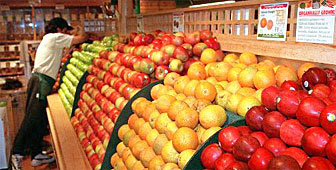Switzerland receives hearty praise for organic farming

A team of international scientists, invited by the federal government to study the impact of organic farming in Switzerland, has praised Swiss farmers for their commitment to ecological practices.
Their findings came as the Federal Agriculture Office announced that nearly ten per cent of agricultural land in Switzerland is now farmed organically, compared to a European Union average of four per cent.
Jost Haar, chairman of the Swiss Agricultural Research Council, an independent body funded by the Swiss government, said the team of scientists had made their assessment after visiting six organic farming research stations around the country.
“Organic farming is of significant importance to the Swiss government,” Haar told swissinfo. “Nearly 10 per cent of Swiss farms are now purely organic and the public at large is inclined to see an increase in this amount.”
Swiss farmers are awarded incentives by the government to encourage them to focus their efforts on organic farming and abandon use of fertilisers and pesticides.
But, Haar argues, the government alone cannot convince farmers to shift production from conventional or integrated farming – which still accounts for 90 per cent of the country’s agricultural output – to organic production.
“Switzerland’s success also has to do with the readiness and willingness of the public to drive agriculture in this direction.”
Consumers buy “Bio”
Cordelia Galli, head of marketing at Bio Suisse, an umbrella organisation of Swiss organic farmers, told swissinfo consumers are happy to pay high prices in supermarkets for products with an organic label.
“A premium product has a premium price, and when the consumer is convinced that he or she is buying a good, healthy, well-produced and well-controlled product, he or she is also willing to pay a higher price,” Galli said.
The “Bio” label on products in Swiss supermarkets offers the consumer a guarantee that no pesticides or fertilisers have been used in the production process. Bio Suisse also ensures the independent inspection of organic farms in Switzerland.
“In the European Union, partly organic products can be made on a farm, but this is not allowed in Switzerland,” Galli said.
Switzerland’s success as a pioneering centre for organic farming, Galli argued, is linked to high consumer demand for uncontaminated products.
“Swiss consumers are very sensitive and they are interested in what they are eating. Very early on we had cases of mad cow disease, so Swiss consumers quickly accepted organic products as a solution,” Galli said.
Long-term trend
But Galli insists the popularity of organic products is not a short-term or knee-jerk response to recent outbreaks of BSE and foot-and-mouth disease in Europe.
“I think it’s a long-term trend, because demand has been on the rise for years and Swiss consumers are more and more convinced that when they buy a ‘Bio’ product, they are getting something healthy and organic.”
Johann Zublin, head of the organic range of products at Switzerland’s leading supermarket chain, Migros, says consumer demand has increased over the past five years.
“Switzerland has been a pioneer in moving away from traditional agricultural production towards organic farming,” Zublin told swissinfo.
Migros stocks around 650 organic products on its supermarket shelves, but Zublin expects this number to rise to over 1000 within the next two years as the company tries to keep up with public demand.
“We expect 8 to 10 per cent of our product range to be organic in the next five to seven years,” Zublin said.
Zublin says the challenge for farmers is to produce goods which are not only healthy but which also “look good” when they are placed on the shelf.
“To a certain extent, consumers are ready to pay a little more. But the quality of the product has to be perfect. They expect not only healthy food, but a salad or apple which is nice to look at.”
Haas says consumer demand is likely to push organic output up from its present national level of ten per cent over the next few years.
“The best guesstimate is that organic farming will increase by anywhere between 15 and 30 per cent in the coming years,” Haas said.
“Compare this with the goal for European farming, which is to be at 10 per cent by the year 2010.”
by Ramsey Zarifeh

In compliance with the JTI standards
More: SWI swissinfo.ch certified by the Journalism Trust Initiative








You can find an overview of ongoing debates with our journalists here . Please join us!
If you want to start a conversation about a topic raised in this article or want to report factual errors, email us at english@swissinfo.ch.